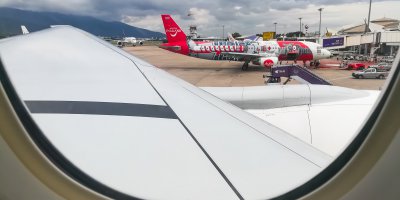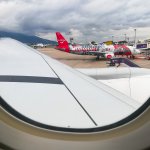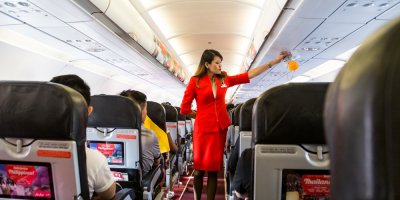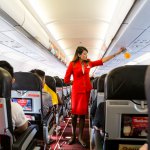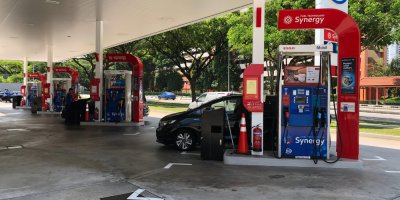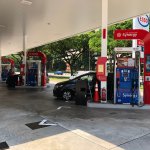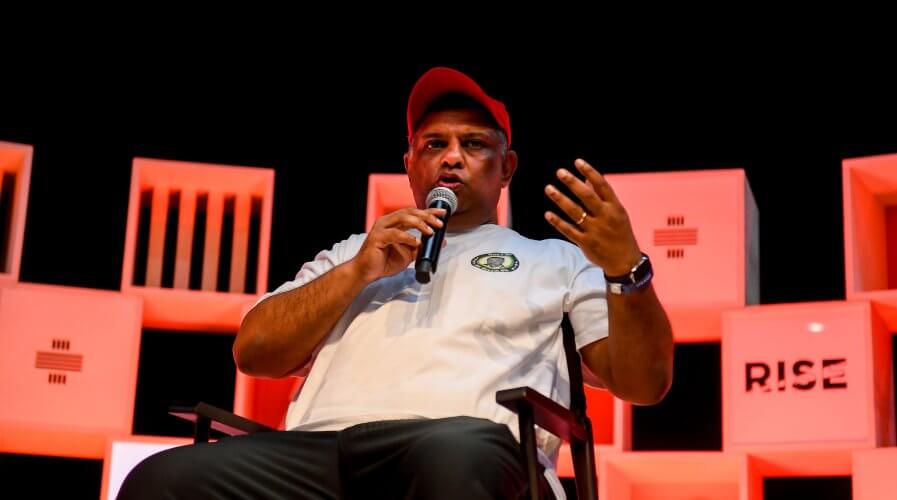
AirAsia CEO Tony Fernandes at RISE 2019 in Hong Kong. Source: Harry Murphy/RISE via Sportsfile
Interview: Will big data help AirAsia CEO realize his next big dream?
ONCE upon a time, AirAsia Group CEO Tony Fernandes’ dream was for his company to be as well known in Asia as Coca-Cola. That has now been realized.
Since its purchase from DRM-Hicom for MYR1 (approx US$0.25) in 2001, the airline has been wowing customers with low-cost fares to more than 130 destinations across Asia and beyond.
Today, AirAsia has more than 25 million frequent flyers — customers who trust the airline with plenty of data about themselves, their tastes and preferences, their choices, and their spending habits.
Fernandes and his company understand the value of that data and are using it to transform the AirAsia Group into a business that has a thriving airline along with a portfolio of successful ventures in logistics (teleport), fintech (BigPay, Tune Protect), food & lifestyle (Santan, T&CO), and the marketplace segment (airasia.com, OURSHOP).
In an exclusive interview with Tech Wire Asia, AirAsia CEO Tony Fernandes shared a vision for where the company is headed and what is next big dream is.
“If you don’t innovate, you die. We know that we can’t rely solely on airline earnings, it’s going to be a disaster. Our airline income has been yo-yo-ing in the recent past because it’s impacted by several factors such as fuel prices and season.”
“What we want to do in the near future is adjust the leverage of the business in such a way that, one day, the volatility in the price oil doesn’t impact our business very much.”
Fernandes, who calls himself a big dreamer, believes that one day, other businesses in the AirAsia Group portfolio will be able to use insights from the airline’s treasure trove of data to not only understand their needs but also put themselves in front of the right customers to make the sale — quickly and effectively.
“Unlike Uber, we don’t need to spend millions on acquiring customers, we have a very strong base of customers who are loyal to us, trust us, and want to buy from us.”
Of AirAsia Group’s portfolio companies, BigPay and Tune Protect are amongst the most successful in terms of brand recognition at the moment, although passengers on AirAsia flights can’t miss the mention of OURSHOP on the front page of the in-flight merchandise catalog and the T&CO logo on food and beverages they purchase.
“Formula 1 is a multi-million dollar marketing exercise for Ferrari. Similarly, in the larger scheme of things for the AirAsia Group, the airline — along with being a great business — is also a massive promotion opportunity for all our portfolio companies.”
What success looks like right now for AirAsia
While Fernandes is personally driving the Group’s innovation agenda to make sure that its portfolio companies actually take-off and flourish, the airline — which is still the chief breadwinner in the portfolio — is leveraging data to maximize revenues while delighting customers.
“AirAsia’s website is fine-tuned to make sure customers not only buy their airplane ticket online but are also able to book the right meal, find a suitable hotel, and gain access to offers and discounts for the right restaurants and activities once they get to their destination — all with just a few clicks — intuitively.”
The airline’s personalization algorithms are quite accurate, Fernandes points out, ensuring that passengers leave the website, delighted, with more than just a ticket in their shopping baskets.
However, the discussion also revealed that the AirAsia Group has its eyes firmly fixed on achieving its goal.
“We’re a technology company that flies airplanes,” Fernandes said on stage at the RISE 2019 Conference in Hong Kong.
His big goal, he told Tech Wire Asia, “Is that one day, you write about AirAsia just as you write about Amazon — as a technology company.”
Putting people at the core of innovation and success
People have always been a core-focus at the AirAsia Group. At the RISE 2019 Conference, Fernandes shared several stories about how the airline empowers staff to follow their dreams to do bigger and better things within the business.
However, what stood out was that in a company with more than 20,000 employees across the business, Fernandes made a conscious effort to keep the channels of communication with employees open.
According to him, caring for the staff is critical to the success of his business.
With regards to the future, however, the Group CEO understands that a lot of handholding will be required in order to transform the people and prepare them for a digital, data-driven future.
“Some of the talent will adapt, some will struggle, and some will have to be imported. Change management, therefore, is very critical.”
Fernandes also revealed that sometimes, change has to be driven unilaterally — it’s why he decided to do away with emails and move away from Microsoft Office.
Instead, the AirAsia Group now chooses to communicate via Facebook Workplace and collaborate using G Suite applications.
“Our message about digital is clear in internal branding, and we’re looking at partnering with Google and others to create programs that help re-train and re-skills our staff for a digital, data-driven future.”
At the end of the day, it seems as though the AirAsia Group is doing all the right things to drive its digital agenda and charge towards its next big goal. With the pace of progress at the company, maybe that goal isn’t so far away after all.
READ MORE
- Strategies for Democratizing GenAI
- The criticality of endpoint management in cybersecurity and operations
- Ethical AI: The renewed importance of safeguarding data and customer privacy in Generative AI applications
- How Japan balances AI-driven opportunities with cybersecurity needs
- Deploying SASE: Benchmarking your approach

